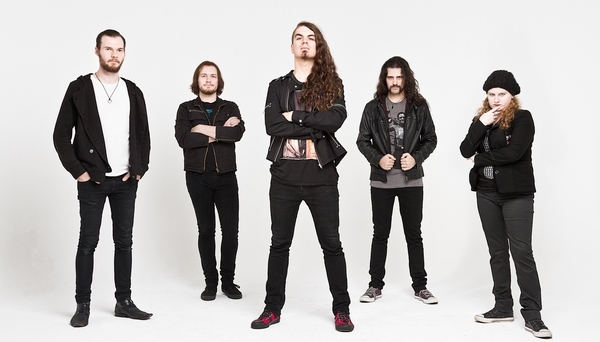“It’s melodic, catchy, it’s a bit poppy,” Estrin says. “I appreciate we’re branded as metal, and I love it, but it doesn’t always fit. The first metal band that hooked me was called Type O Negative, a band in the early ‘90s. I remember listening to triple j’s 3 Hours of Power and I remember hearing melody, hearing this heavy guitar, and thinking, ‘What. Is. This?’ All I’d been listening to up until then had been Nirvana, and the combination of that real heaviness – those chunky low guitars and the amazing melodies – completely turned me. And it all went downhill from there. The next week I was there listening to really hardcore black metal, which my dad described as sounding like a vacuum cleaner.”
Over the last decade, Voyager’s popularity at home has led to major headline tours and some impressive supports. But it’s the band’s international success that marks them as an act making steady waves. While Europe is the spiritual home of metal these days – and has certainly embraced the Perth lads with open arms – Voyager have found even greater success somewhere unexpected.
“I think our popularity in Europe has been dwarfed by what we’re experiencing in the US and Canada,” Estrin says. “They’re difficult markets to break. We played there for the first time in 2011, and got invited back for 17 shows in 2012 and the reception was just incredible. The thing I notice with US fans, especially with the heavier genres, is that they’re super loyal. They’ll hear you once, and then they’ll be on your Facebook, your Instagram, and constantly be stoked to follow you. So I think the US has more of a hard-fan culture than Australia. I mean, Australians love to go to an outdoor gig and check it out, but the hardcore fan culture is much stronger in the US. Fans around the world are always different, but they always know that we bring a good live show, and while we take our music seriously, we don’t take ourselves too seriously.”
Given heavy metal’s chequered history – from Ozzy Osbourne’s insanity to Tipper Gore’s censorship – it’s little wonder that fans of the genre now come from a wide sweep of backgrounds. Time is, after all, the great leveller, and while there was a period when heavy gigs would be picketed, they’re now far more accessible. As Estrin says, it’s an exciting time to be riding that strange wave.
“I think now we’ve got a culture of what you might call smarter heavy music,” Estrin says. “Bands like Karnivool, Dead Letter Circus, they’re accepted by a wider audience now. It’s not something which is necessarily anti-establishment. There are lyrical themes which are not just ‘Screw the system,’ you know? If you look at your metal-head now, they’ll look like normal people. They don’t need to be wearing leather jackets or trench coats with patterns. Some people lament that the scene’s dying, but I think it’s great. It shows that people can get into heavy music from all walks of life. I think we’re at a point now where heavy music – not necessarily metal, that probably still has a bit of a stigma to it – but progressive heavy music is definitely being accepted, and is one of the strongest points in the Australia music scene. Record numbers, bands doing big things overseas – it’s awesome to see.”
BY ADAM NORRIS







